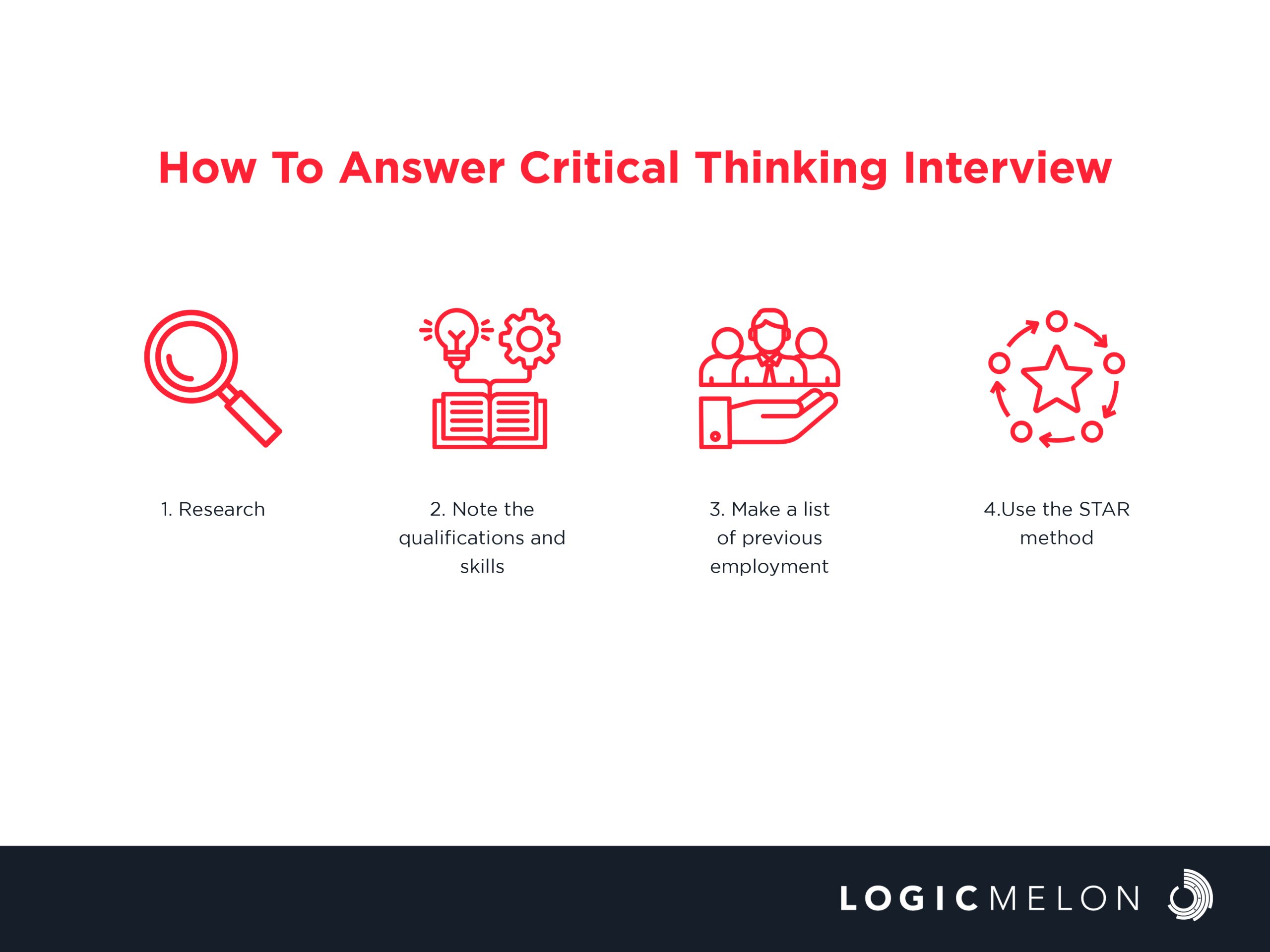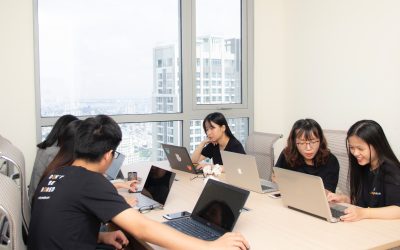10 Critical Thinking Interview Questions To Ask In Your Interview
Critical thinking interview questions are designed to gather information about a candidate’s problem-solving skills, ability to assess the merits of opposing viewpoints and capacity for logical argumentation.
Being capable of clear, reasonable thought, as well as being able to see how concepts are related logically is known as critical thinking. To evaluate information sources and creating your arguments, critical thinking is important. It strongly emphasises taking a logical and impartial approach that can assist you in locating reliable sources, and supporting your view.
4 Critical Thinking Skills
The following are some of the skills needed for critical thinking:
1. Problem-Solving
Once the performance is analysed and solutions are discussed, it is crucial to implement a solution. Finding an effective solution and analysing the effects of this decision is an important part of critical thinking. This requires flexibility, so the action plan can be changed as necessary during the implementation phase.
2. Creativity
To find patterns and information data, innovations and creative skills are needed after careful observation and analysis. Critical thinkers can think creatively to find a solution no one else has considered before. For this, it is necessary to be adaptable, intellectual, and imaginative to choose a different strategy if the one you have isn’t working.
3. Observation
The capacity to observe a problem or data set is where critical thinking begins. To correctly convey the implications to others, one needs good analytical abilities to study the data, and comprehend what it means.
4. Communication
Strong communication allows critical thinkers to convey their approaches, and conclusions to others at work. It is important that concepts and solutions are communicated to others effectively and efficiently. Additionally, collaborating with others to figure out the best solutions to business challenges is a crucial part of the critical thinking process. Active listening, collaboration, teamwork, and interpersonal skills are all necessary.
Critical Thinking Interview Questions – Sample Questions
- Give an example of a decision you had to make, but couldn’t because you lacked all the information. How did you act?
- Describe a situation in which you had to persuade your team, managers, or senior executives to adopt a different approach to solving a problem.
- What steps should you take to fix a problem? Can you offer an illustration?
- Can you describe your decision-making process, and how you arrived at a previous choice?
- Describe a time when you were provided with an idea at work that you hadn’t thought of previously. How did you act?
- Committing a critical error in a public report, but it has already been distributed to stakeholders. How do you respond to the circumstance?
- You find a way to solve a problem that’s less time-consuming, resource-intensive, or expensive. Your manager doesn’t seem to understand despite your best efforts to explain it to them. How do you behave?
- You are currently working with a group of specialists who all have quite distinct project-direction notions. The deadline is almost approaching. How do you locate a solution?
- A coworker offers a difficult solution to a dilemma the organisation is experiencing. How would you respond to the circumstance?
- How do you handle conflicts with coworkers or peers?
How To Answer Critical Thinking Interview Questions
Candidates can provide examples of how they apply reason and logic to make decisions that will stand out to interviewers. To do this, it is important that you organise your answers in a way that walks the interviewer through an instance in which you successfully applied your critical thinking skills. You can think about doing the following action to get started:

1. Research
Research is the initial step in interview preparation. You must be aware, and learn more about the role and company before you respond to interview questions in a precise way. Also, you need to understand the job requirements for strong answers. To identify the required skills, work experience, and qualities for the position, researching the company and job description can help you effectively.
2. Note the qualifications and skills
You have the ideal opportunity to show why you are the best candidate for the position when faced with behavioural interview questions about your critical thinking abilities. Your starting point for developing your responses should be the abilities and competencies you have discovered from your research. List the required skills. and assign a priority.
3. Make a list of previous employment
After ranking the talents in order of priority, you can begin to consider employment experiences that are related to these skills. It is challenging to come up with a specific answer during an interview, particularly when talking about critical thinking skills.
Interviewers are interested in learning about your ability to evaluate information, and make thoughtful conclusions objectively. Make a list of previous experiences, and fit each one to the necessary critical thinking skills. Highlight instances in your work where you successfully offered logical guidance and developed thoughtful solutions. Put your attention towards a clear and simple response.
4. Use the STAR method
Using the STAR (Situation, Task, Action, Result) method, the candidate is able to give an answer to what the interviewer is looking for. Each phase in the STAR acronym is described below:
Situation
Start answering by explaining the situation you have faced. The start of your response should begin with “what, who, and why.” For instance, what was the issue, who participated, and why did the issue occur at that time?
It is crucial to explain the context of the problem that needs to be solved. Additionally, be sure to provide relevant information about why you have to use your critical thinking skills in that specific situation.
Task
A task is something where you explain your role in that task. Include essential information, like specified duties. Give the interviewer a clear view of your role in solving the problems that occurred. For instance, why did you get involved in that situation?
Action
After specifying your task, discuss the actions you have taken to solve the problem. Go into detail about the actions you have taken. For instance, what steps have you taken to solve the situation?
Result
End the answer by discussing the results you obtained from your actions. Give details about the outcomes of your actions, and make sure to mention your strengths. Focus on the positive results of your experiences. For instance, what did you learn from the situation?
Why Interviewers Ask Critical Thinking Questions
The best way for interviewers to reveal your critical thinking abilities is to ask you to discuss prior job experience, or provide you with hypothetical scenarios. Interviewers want to learn how you think and behave in different situations, which is why they ask you about instances in which you successfully applied your critical thinking skills.
It is important that you have a few examples ready of how you used your critical thinking skills in the past to discuss in the interview. Your ability to use critical thinking to solve problems can help you convince the interviewer. This is another reason why it is a good idea to prepare responses to questions about the requirement of the job before your interview.
Benefits of Critical Thinkers
The following are some of the benefits of critical thinkers:
- Acquired analytical abilities: They thoroughly assess each circumstance.
- Good analytical abilities: They make rational, fact-based arguments.
- Dependable emotional perception: They are able to identify lies, and distinguish amongst them.
- Social interaction: They conduct additional research, or use prior knowledge as a guide. They limit bias by using well-established, agreed on standards.
- Compare and contrast: They draw comparisons, and discern between variations.
- Consider solutions: They picture a solution, and its possible outcomes.
- Action calculation: They quantify their findings, and make a firm decision.
- Imaginative reasoning: They change the circumstance from bad to good.
Frequently Asked Questions
1. What are the 5 elements of critical thinking?
- Ask inquiries.
- Gather relevant data.
- Consider other options and conclusions.
- Think about various points of view.
- Effective communication.
2. What are the types of critical thinking?
The following are three types of critical thinking:
- Analysis
- Inference
- Evaluation
3. What are the most common interview mistakes?
The most common interview blunders made by candidates are showing up too early or late, and not conducting any company research. You can tell if a candidate is interested in the job, and has solid time management skills by looking at these factors.
Closing Thoughts
One of the most important traits to look for when hiring new employees is critical thinking. Employees won’t always have access to the data or information required to solve a problem. Furthermore, not every issue has a simple “black or white” resolution. To handle challenging situations, employees need to be able to think creatively. So, how can we even start to evaluate a candidate’s capacity for critical thought? It may work better if you ask critical thinking interview questions.
LogicMelon
Award-winning recruitment software that will find, attract, hire and analyse the way you want to work. At LogicMelon, we have experienced software recruitment marketing specialists to help you build effective recruitment solutions supported by the best customer service you’ll find anywhere!
Email: sales@logicmelon.com or call LogicMelon (UK) +44 (0) 203 553 3667 (USA) +1 860 269 3089
Recruitment Crisis Management
Recruitment crisis management requires adaptability, strategic thinking, and a proactive approach to address talent shortages and avoid disruptions.
Candidate Matching: Everything You Must Know
To successfully implement an ATS, it is important to consider certain factors. Learn more by reading this blog.
Streamlining Recruitment: ATS Implementation Best Practices
To successfully implement an ATS, it is important to consider certain factors. Learn more by reading this blog.


